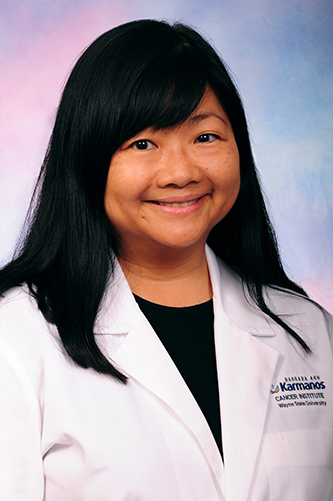
Elisabeth Heath, M.D., F.A.C.P., leader of the Genitourinary Oncology Multidisciplinary Team, associate center director of Translational Sciences and the Patricia C. and E. Jan Hartmann Endowed Chair for Prostate Cancer Research for the Wayne State University School of Medicine and the Barbara Ann Karmanos Cancer Institute, has received a four-year funding renewal from the Department of Defense for participation in the Prostate Cancer Clinical Trials Consortium program.
This is a peer-reviewed, competitive grant. This year, only seven sites were funded, down from 11 sites in 2013.
WSU and Karmanos have been part of the consortium since 2008. The budget amount for the new four-year grant is $1,232,000.
Dr. Heath's co-principal investigator is Ulka Vaishampayan, M.D., director of the Eisenberg Center for Translational Therapeutics. Co-investigators are Isaac Powell, M.D., and Lance Heilbrun, Ph.D., faculty member of the WSU School of Medicine.
A major goal of the DOD's Prostate Cancer Research Program Consortium, of which the PCCTC is a part, is to bring together teams of exceptional prostate cancer researchers in a multidisciplinary, synergistic manner to best address major issues and needs in prostate cancer research and clinical care. To accomplish this goal, the PCRP supports several consortia at leading prostate cancer research institutions.
The Prostate Cancer Clinical Consortium Award mechanism was established in 2005 to support the collaborations and resources necessary to rapidly execute Phase II or Phase I/II clinical trials of therapeutic agents or approaches for the management or treatment of prostate cancer. The overarching goal of the award is to combine the efforts of leading investigators to bring to market novel therapeutic interventions that will ultimately decrease the overall impact of prostate cancer.
Prostate cancer is the most common cancer in males and the second-leading cause of cancer deaths among males in the United States. African-American men have 1.6-times greater prostate cancer incidence and a 2.4-fold higher mortality rate from prostate cancer relative to Caucasian men. They often present with higher prostate-specific antigen levels, higher grade disease and more advanced disease.
Although the reasons for these disparities are not well understood, WSU-Karmanos researchers are actively studying potential contributors, including socioeconomic factors hindering access to prostate screening and appropriate medical treatment, and racial differences in cancer biology. Despite the higher incidence of prostate cancer in African-American men nationwide, the proportion of those patients accrued to prostate cancer clinical trials remains disproportionately low.
African-American men face numerous socioeconomic, religious and health barriers to participating in clinical trial-based therapy. By increasing trial opportunities and resources within an accessible health care system located in a predominantly African-American community such as Detroit, Dr. Heath and her colleagues are striving to improve clinical trial access and overcome some of the other potential barriers to clinical trial enrollment for African-Americans.
The researchers said that being a member of the PCCTC will have a major impact on prostate cancer clinical management in Detroit because they will have access to diverse agents for treatment and will be able to develop clinical trials that focus on the effects of treatment on the biology of men with high-risk or more aggressive disease.
Other DOD funded sites include Memorial Sloan Kettering Cancer Center in New York City, Dana-Farber/Harvard Cancer Center in Boston, Duke Comprehensive Cancer Center in Durham, N.C., and Johns Hopkins Sidney Kimmel Comprehensive Cancer Center in Baltimore, among others.
The grant application number is PC161031.